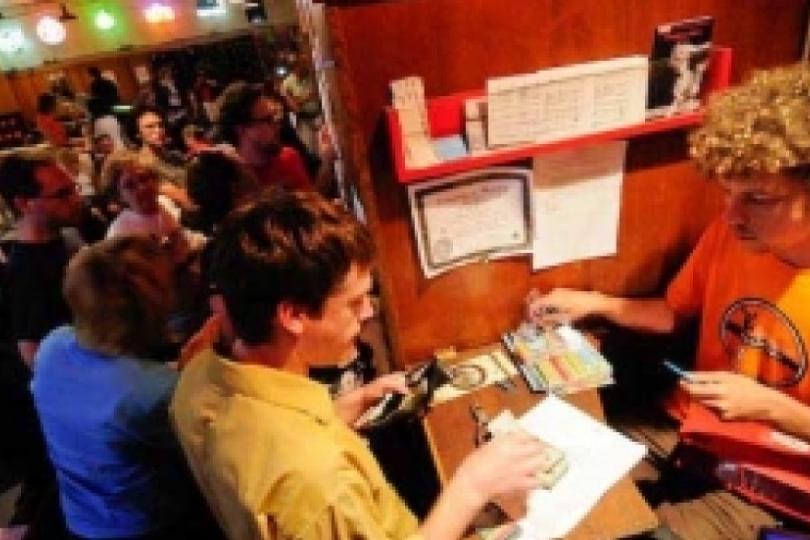Summer activism
Editorial

Enjoy the summer while it lasts.
Rest up before the 2011 Fringe Festival.
MinnesotaPlaylist.com will cover it exactly as we have in the past two years: with bloggers, including a photographer, running around the city looking for angles and aspects you haven't thought of or seen yet.
In the meantime, through the month of July, enjoy our large, and growing, archive of excellent articles from the past (almost) three years, appearing randomly below this article on the home page. Every time you return to the website, you'll see a whole new batch.
Also, in the meantime, watch this video.
Minnesota Artists for Equality was begun by local actors Adam Whisner and Amanda Whisner, Jane Froiland, and David McMenomy. I'll let the video, website, and this facebook page speak for itself.
But why, do you ask, are we mentioning politics on this website?
One, because we can. Unlike the theaters we cover, we're not a non-profit. We pay taxes, and we can say whatever we like, and this organization, MAE, is one that we like. Two, there is a government clusterfuck right now that effects a lot of people's lives in very serious ways, and as I enjoy the amazing summer weather we're finally having and eagerly anticipate the Fringe Festival, I also can't help but wonder--inspired by this interesting new group MAE--what is the role of the artist in politics?
Personally, as a writer, I wish I didn't have to take sides at all. All politicians are corrupt or at least compromised. Because Politics is the place where we reconcile the competing interests of many different people who live in proximity to each other. As a writer, I want to observe, identify, perhaps satirize, and definitely see objectively, all sides. It isn't my job to solve political problems; it's my job to write entertaining stories about them.
But what I see now is that politicians, no matter how nice and well-spoken, are not leaders. They are--at best--negotiators, deal-makers, representatives. The moral and ethical questions whose subjective answers direct the course of your actions in life should not be addressed by politics. You should follow your priest or rabbi or imam, your favorite poet or writer, your friends, neighbors, family, mother or father. Politicians, politics, should only come into play after those circles of influence have been consulted, after those battles have been fought inside you. The job of a politician should be to find a working government that allows for you to live your life according to your principles while your neighbor lives according to theirs. Nothing will be perfect.
Unfortunately, I think we've somehow gotten confused about who should be leading and who should be following here. Politicians have somehow come to believe, and we've let them believe, that the political arena is where you fight battles over the soul. They think they're leaders when they're supposed to be workers.
So, in the current environment, we're all required to choose sides. Personally, I'll take forced and fake empathy (Democrats) over forced or fake authenticity (Republicans) every time. Years ago, a Republican I knew explained to me that he'd rather have to step over homeless people on his way to work every day than have his own freedom curtailed one bit. There are so many things wrong with this statement--What if he assumed for a second he was the one without a job? Why does he have to step over them? He can't stop for a second and help them up? Does a feeling of responsibility, no matter how small, curtail somehow his freedom? What does that have to do with freedom? --but at the time I remember saying, "I would respect your strict adherence to principle, as you seem to want me to do, if your principle didn't appear to entirely lack the equally respectable quality of humanity."
But, perhaps, little of this matters to people who read this website. Yes?
Except to say this: What is the place of the artist in politics? Purely didactic art that takes one clear side in a argument with two sides generally makes for purely crappy art. I agree. Yet, politicians shouldn't be the only ways talking about the nature of the society we live in, what it is now, and what we aspire for it to be in the future, should they? In fact, I think they--politicians, economists, mathematicians, political scientists, and all sorts of people who seem to enjoy talking about human nature without any experience in the complex, open-hearted study of human nature--I think they barely have the brain power, and more importantly the soul power, to be debating and battling about this stuff at all. I think politicians especially should see their job as "keeping the lights on." If they do that, if they find a way to reconcile administrative difference, then the rest of us can get on with the business of life--whether that be religious conflict, ethical debate, or even guilt-driven kindness. Or writing. I would consider a success for freedom the fact that you, Mr. Politician, kept government open, so that the rest of us can live our lives.
So I can't help but wonder: What role might artists have in changing the dysfunctional dynamic we currently experience at all levels of government? How might you use your role as an artist to lead, to alter people's minds and hearts, to literally move them, without compromising your role as an artist and becoming merely a politician?
Maybe think about that while you're enjoying the beautiful sunshine. Let me know if you come up with anything.
See you in August at the Fringe Festival.


